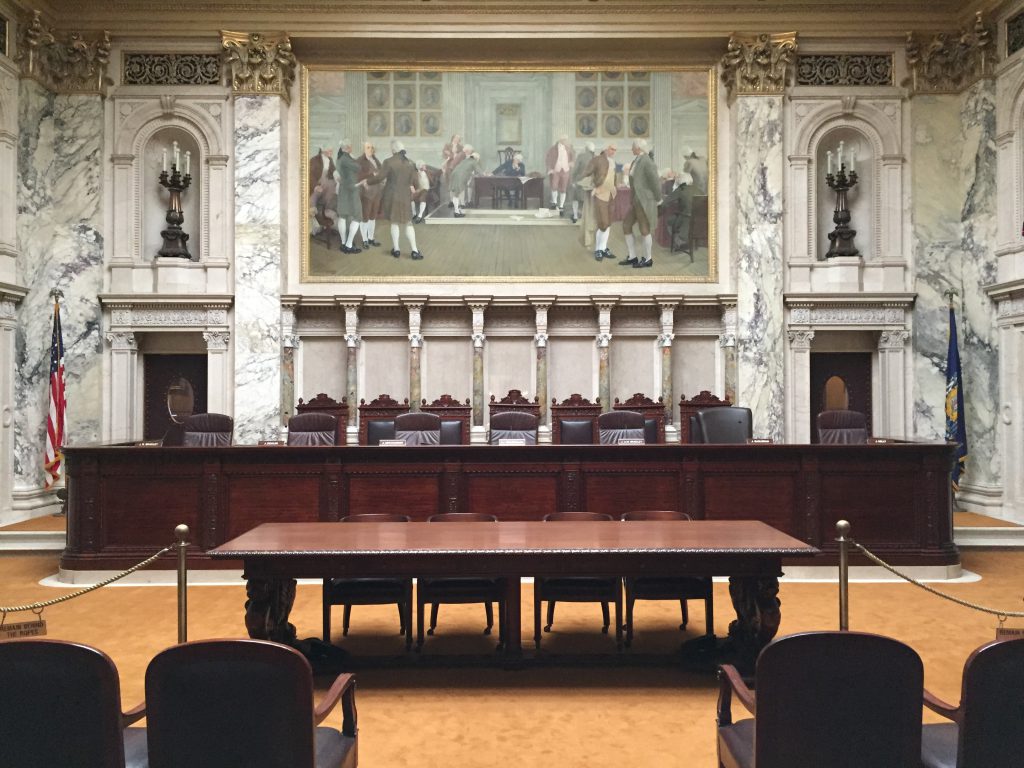Recusal At Issue in High Court Race
State Supreme Court has one of nation’s weakest rules to prevent ethical conflicts.
On April 2nd, Wisconsin voters will go to the polls to elect a successor to retiring State Supreme Court Justice (and Chief Justice from 1996 to 2015), Shirley Abrahamson. Spring, non-partisan elections always see a much lower voter turnout than November, partisan elections; in past spring elections, turnout hovered at about 10 percent. However, last spring, voter turnout for the state supreme court election, won by Rebecca Dallet over Michael Screnock, saw a vast increase in voter turnout to about 20 percent.
In addition to increased pubic attention on the election, the issue of Wisconsin’s notoriously weak recusal rules for judicial candidates receiving either direct campaign contributions, or benefiting from election spending by “outside” special interest groups, became an important issue in that contest. Dallet favored stronger judicial recusal rules, Screnock opposed them.
Wisconsin currently ranks 47th of the 50 states in the strength of our judicial recusal rules Even Illinois does a better job than Wisconsin in preventing the obvious conflict of interest that allows our state judges to rule in cases where they have been the beneficiaries of substantial campaign contributions or election spending by a party before that judge in a trial.
Wisconsin’s current recusal rule was written by two of Wisconsin’s biggest special interest groups – Wisconsin Manufacturers & Commerce and the Wisconsin Relators Association – in 2010 and it was adopted verbatim by the 5 to 2 conservative majority of the court. The rule said that judges themselves can decide to recuse themselves or not, with no threshold or standard to abide by.
Many prominent retired Wisconsin jurists, including two former Wisconsin Supreme Court Justices (Janine Geske, an appointment of Gov. Tommy Thompson, and Louis Butler, appointed by Gov. Jim Doyle) have called for stronger recusal rules for judges at all levels in Wisconsin. A 2017 petition to the Wisconsin Supreme Court signed by Geske, Butler and 52 other retired jurists calling for stronger rules was rejected 5 to 2 by the conservative majority and, furthermore, the petitioners were denied even a public hearing on their proposal to the state’s highest court.
The need for stronger judicial recusal rules is beginning to percolate as a significant issue in the three weeks before the upcoming April 2nd election. Both of the candidates for the state supreme court this year, Chief Judge of the Wisconsin Court of Appeals Lisa Neubauer, and Wisconsin Court of Appeals Judge Brian Hagedorn addressed this issue and other relevant matters in responding to the League of Women Voters of Wisconsin candidate questionnaire – enter your address on the League’s Vote411 website here to view their answers.
For why stronger judicial recusal rules and voter turnout are so important in this election and beyond for Wisconsin read this recent Wisconsin State Journal guest editorial written by CC/WI Director Jay Heck and LWVWI Director Erin Grunze.
Jay Heck is the executive director of Common Cause in Wisconsin, the state’s largest non-partisan citizen reform advocacy organization. For more information go to their website: commoncausewisconsin.org or call 608-256-2686.
Op-Ed
-
Unlocking Milwaukee’s Potential Through Smart Zoning Reform
 Jul 5th, 2024 by Ariam Kesete
Jul 5th, 2024 by Ariam Kesete
-
We Energies’ Natural Gas Plans Are A Mistake
 Jun 28th, 2024 by John Imes
Jun 28th, 2024 by John Imes
-
Milwaukee Needs New Kind of School Board
 Jun 26th, 2024 by Jordan Morales
Jun 26th, 2024 by Jordan Morales





















